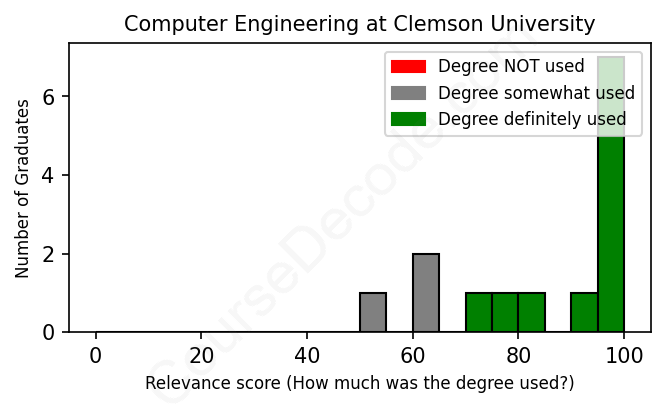
First, some facts. Of the Computer Engineering graduates from Clemson University we've analyzed , here's how many have used (or NOT used) their degree in their career:

These are estimates based on AI analysis of 14 LinkedIn profiles (see below).
The verdict? Significantly above average. Overall, with an average relevance score of 85%, Computer Engineering graduates from Clemson University have a much higher likelihood (+18%) of finding work in this field compared to the average graduate across all fields:
And for comparison, here's the chart for all profiles we've looked at across all degrees.
Also, after graduating, only 28% of these graduates have pursued further education other than another Bachelor's degree (such as a Masters degree or other), compared to the average across all profiles of 35%. This suggests a Bachelors degree is enough for most Computer Engineering graduates, and it's normal to look for work straight after graduation.
See the details:
|
Relevance score: 93% We think this person has gone into a career highly relevant to their degree. We think this person has gone into a career highly relevant to their degree.
DEGREE INFOGraduated in 2016 from Clemson University with a Bachelor of Science (B.S.) in Computer Engineering. No other secondary education since. JOB HISTORY SINCE GRADUATIONSoftware Developer Farragut Systems May 2016 - Jun 2017 Technologist  Booz Allen Hamilton Jun 2017 - Dec 2018 Staff Technologist  Booz Allen Hamilton Jan 2019 - Aug 2019 Solution Architect  Syngenta Aug 2019 - May 2020 Software Associate  Revature Feb 2023 - May 2023 Software Engineer  Revature May 2023 - Sep 2023 ABOUTPragmatic Full Stack Software Engineer with a demonstrated history of performance working in the app consulting industry. Current working skill set includes Angular, Spring Boot, PostgreSQL, and AWS. Additionally experienced in .NET Core, Microsoft SQL Server, iOS and more. |
The top 10 most common jobs done by the graduates we've analyzed (ranked most common to least) are:
When looking at the different jobs held by graduates from Clemson University's Computer Engineering program, you’ll mostly see a strong emphasis on software engineering roles. Many of these individuals have secured positions like Software Engineer, Senior Software Engineer, and Software Developer, which all directly leverage the programming skills and engineering principles they learned during their studies. These roles not only tap into their technical expertise but also reflect the increasing demand for software talent in various industries, showcasing a clear alignment with their educational background.
However, it’s important to note that not every job listed is directly relevant to Computer Engineering. Some roles, like Application Engineer or PLM Project Manager, focus more on application management or project oversight rather than on core engineering tasks. Additionally, there are roles like Network Analyst or Electrical Engineer that, while still associated with technical skills, may not utilize the full scope of what a Computer Engineering degree covers. So, while many graduations lead to relevant careers in software development, there’s a bit of diversity in how closely aligned these positions are with their degree specialization.
Here is a visual representation of the most common words in job titles for Computer Engineering graduates (this is across all Computer Engineering graduates we've analyzed, not just those who went to Clemson University):

It looks like graduates from Clemson University's Computer Engineering program generally find their footing in solid tech-related careers right after graduation. For many, their first job tends to be in roles like software engineering, application engineering, or research assistant positions. This aligns well with the skills they develop during their degree. For instance, several grads have stepped into positions like Software Engineer or Application Engineer shortly after graduation, setting a great foundation for their careers. It seems many begin their journey in entry-level roles that allow them to gain hands-on experience in software development or IT, which is crucial in this field.
As time goes on—typically 5 to 10 years after graduating—these alumni progress into higher-level positions, such as Senior Software Engineer, Solution Architect, or even Project Manager roles. It's pretty impressive to see that many of them are still within the tech industry, moving into specialized roles and leadership positions. Sure, there are a couple of cases that drift into non-engineering roles or fields that aren't directly related to computer engineering, but the majority seem to thrive in relevant careers, indicating that a degree from Clemson in this discipline can lead to successful, enduring careers. Overall, this suggests that the program does a great job of preparing students for the job market, and many Clemson grads are certainly seeing the fruit of their education pay off years down the line.
Getting a Bachelor’s degree in Computer Engineering at Clemson University is definitely on the challenging side, but it’s manageable if you stay motivated and seek help when needed. You'll be diving into a mix of tough math, programming, and hardware concepts, and some of those classes can really push you to your limits. There’s a fair bit of teamwork in projects too, which can either make things a lot easier or add some stress—depends on who you’re teamed up with! Overall, while it's more demanding than some other majors, if you have a passion for tech and are willing to put in the effort, you can totally handle it. Plus, you’ll be learning some really cool stuff along the way!
Most commonly, in the LinkedIn profiles we've looked at, it takes people 5 years to finish a Bachelor degree in Computer Engineering.
Looking at the careers of these Clemson University graduates, it seems like they’re generally on pretty solid financial ground, especially those who graduated a bit earlier. The graduates from 2014 to 2019 have landed roles like Senior Software Engineer and PLM Project Manager, which usually offer good salaries—think definitely above average for recent grads. Even the 2021 and 2022 graduates are entering respected positions at places like the Navy and Cisco, which bodes well for future earnings. The only outlier might be the 2023 grad still in an internship, but that's pretty standard. Overall, I'd say they’re doing pretty well money-wise, especially if they keep climbing the ladder in tech and engineering!
Here is a visual representation of the most common words seen in the "about" section of LinkedIn profiles who have a Bachelor degree in Computer Engineering (this is across all Computer Engineering graduates we've analyzed, not just those who went to Clemson University). This may or may not be useful:

Here are all colleges offering a Bachelor degree in Computer Engineering (ordered by the average relevance score of their Computer Engineering graduates, best to worst) where we have analyzed at least 10 of their graduates:
| College | Score | Count |
|---|---|---|
 University of Florida University of Florida
|
95 | 18 |
 Michigan State University Michigan State University
|
94 | 10 |
 Brigham Young University Brigham Young University
|
94 | 10 |
 Penn State University Penn State University
|
92 | 14 |
 California Polytechnic State University-San Luis Obispo California Polytechnic State University-San Luis Obispo
|
91 | 14 |
 University of Central Florida University of Central Florida
|
90 | 14 |
 Georgia Institute of Technology Georgia Institute of Technology
|
90 | 14 |
 Purdue University Purdue University
|
86 | 34 |
 University of Illinois at Urbana-Champaign University of Illinois at Urbana-Champaign
|
86 | 30 |
 Iowa State University Iowa State University
|
86 | 25 |
 Texas A&M University Texas A&M University
|
85 | 17 |
 San Jose State University San Jose State University
|
85 | 16 |
 Clemson University Clemson University
|
85 | 14 |
 Dwarkadas J. Sanghvi College of Engineering Dwarkadas J. Sanghvi College of Engineering
|
85 | 10 |
 North Dakota State University North Dakota State University
|
84 | 12 |
 Savitribai Phule Pune University Savitribai Phule Pune University
|
83 | 25 |
 University of Mumbai University of Mumbai
|
82 | 43 |
 New Jersey Institute of Technology New Jersey Institute of Technology
|
81 | 11 |
 University of North Carolina at Charlotte University of North Carolina at Charlotte
|
79 | 11 |
 California State Polytechnic University-Pomona California State Polytechnic University-Pomona
|
76 | 11 |
 The University of Texas at Dallas The University of Texas at Dallas
|
76 | 18 |
 University of South Florida University of South Florida
|
69 | 10 |
 Gujarat Technological University, Ahmedbabd Gujarat Technological University, Ahmedbabd
|
55 | 13 |